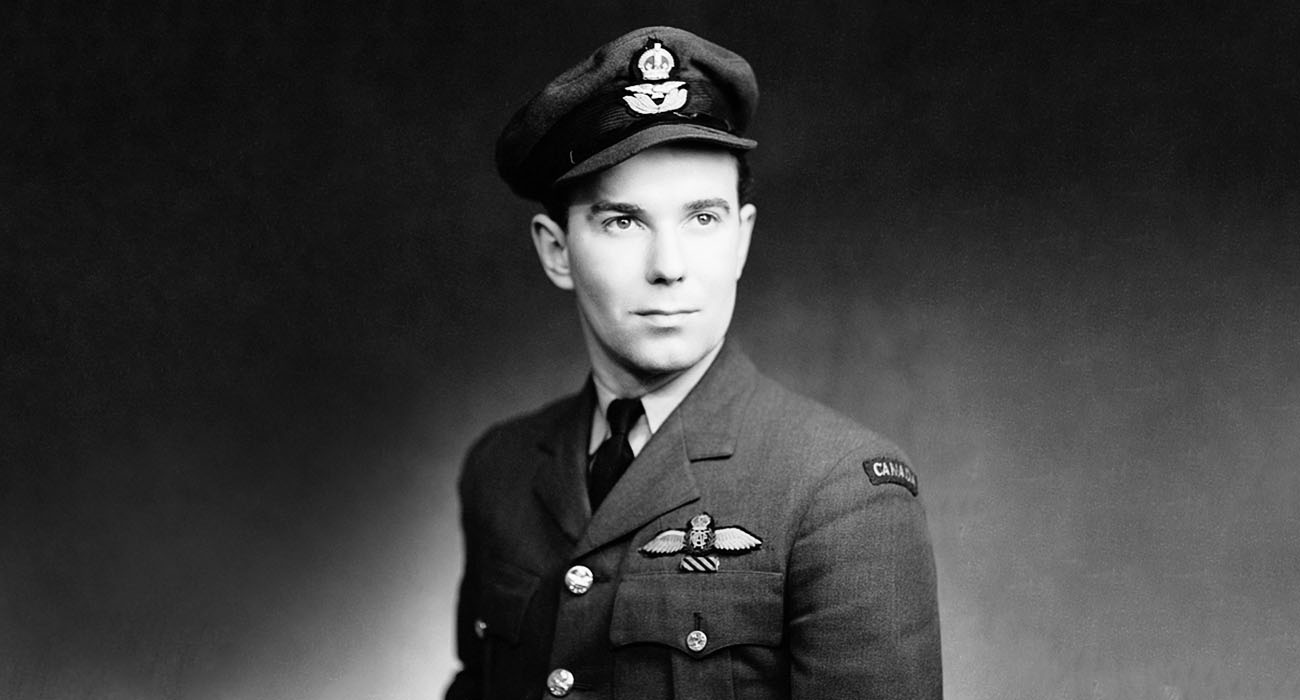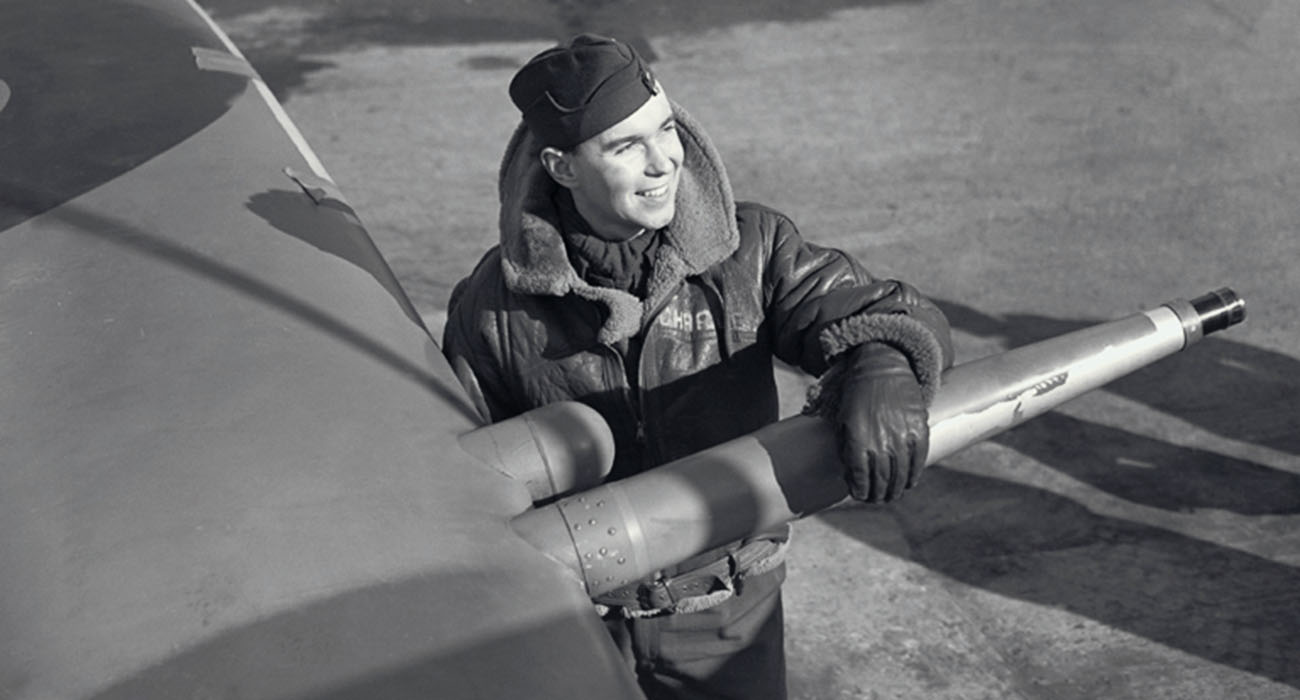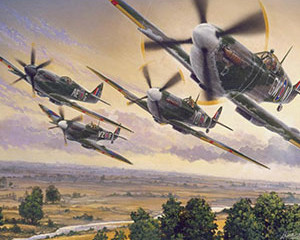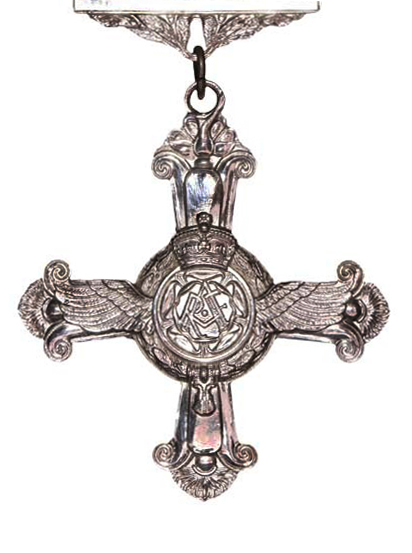Charley Fox, DFC, CD
Distinguished Flying Cross and Bar

Charley Fox, the Canadian pilot who stopped Rommel in Normandy
In the fall of 1945, a train carrying wartime troops from the campaign to liberate Europe delivered a 25-year-old air force veteran to the platform in Guelph, Ont. Flush with victory over the Luftwaffe, Charley Fox came home with one of the most distinguished air combat records of the Second World War — 222 operational missions and two Distinguished Flying Crosses, as well as credit for taking Germany’s most celebrated officer out of the war. He returned to his wife and son and the department store job his employers had held for him. There, he received an unexpected visit from the mother of one of his childhood chums, Andy Howden, killed in the air war overseas. The distraught woman grabbed Fox by the shoulders and shook him.
“Why my Andy?” she cried, “and not you!”
“Mrs. Howden, I don’t know why not me,” he replied trying to console the woman. So deep was the effect of this encounter that Fox committed himself to recounting the stories of fellow Canadian veterans. Eventually, his crusade to inform school children, historical societies and serving troops became known as Torch Bearers Canada. His sporty Saab with its flaming torch emblem on its bumpers has zigzagged across the province, delivering him to more speaking engagements than he flew sorties. He has spoken from the heart without fanfare and without a speaking fee. He has never stopped answering Mrs. Howden.
Over the weekend, his “Why not me” mission came to an end. On Saturday, Fox drove from the Tillsonburg airstrip to join fellow members of the Canadian Harvard Aircraft Association for brunch. He never made it, dying in a car crash just south of the airport. His CHAA friends lamented that at 88, Charley still had lots planned in life.
Charley Fox’s teenage plans had never included flying. He once refused a flight over Hamilton for fear he’d be airsick. But on a summer day in 1934, when he was 14, he watched a touring flight of RAF Hawker Fury fighter aircraft swoop low and fast over his home in Guelph.
“They were silver-coloured fighter biplanes,” Fox said. “Five [of them] came zooming over the top of College Hill, glinting in the sunlight. Then, swoosh, they were gone. But I never forgot it.”
When war broke out in 1939, Fox left his job and enlisted in the RCAF. He’d set his sights on flying the fastest fighter aircraft of the day — the Spitfire. Because he graduated second in his class, however, the Air Force told Fox he would train military pilots in the British Commonwealth Air Training Plan. From 1941 to 1943, instructor Fox trained hundreds of pilots.
As a result of his two years of instructing in Canada, Fox accumulated 1,500 flying hours, but he still flew tail-end-Charlie (last man in a group of four Spitfires) when he joined fighter command at Tangmere aerodrome in England in 1944. On his first combat sortie over the English Channel with Canadian fighter ace Buzz Beurling leading, Fox overcompensated during a formation takeoff and accidentally allowed his propeller tips to scrape the tarmac. Later that night, Beurling disciplined him over a game of billiards.
“Shoot, Charley, that was a stupid thing to do,” Beurling said. “The prudent thing would have been to turn back.”
“That would make me look yellow,” Fox protested. Just then, Tangmere station came under bombing attack. The two Spitfire pilots dove under the pool table for cover. Fox turned to his squadron leader for a final word. “Consider yourself told off,” Beurling said. Initiation complete.
Charley Fox’s brushes with history only began with Beurling. He scrambled numerous times from that storied Battle of Britain aerodrome in the lead-up to D-Day. As the June 6, 1944, invasion began on the beach, Fox and his RCAF 412 Squadron flew three operational trips over Normandy, protecting thousands of ships and landing craft.
“I felt very much alive that morning,” Fox said. “For some reason, everything was so much more intensified at the moment –our smell, sight, everything. We were living on the edge.”
Throughout that summer Fox and his squadron mates dive-bombed German rocket sites that began launching V-1 and V-2 rockets at English civilian centres. And as the Germans fell back in France, Allied Spitfires hastened the retreat by chasing German locomotives, tanks and truck convoys, all considered “targets of opportunity.”
Fox’s greatest “opportunity” appeared on the afternoon of July 17, 1944. He and his wing-mate Steve Randall spotted a German staff car racing along an avenue of trees. While Randall protected his quick descent, Fox swooped in out of the sun, strafed the vehicle and drove it off the road.
“I timed the shots so that I was able to fire and get him as the car came through a small opening in the trees … I got him on that pass,” Fox said. “We were moving pretty fast, but I knew I got him.”
By the time Randall and Fox had landed back at their base, the radio buzzed with exciting news. An Allied pilot had shot up a Horch convertible containing a driver, three German officers and the Desert Fox himself, Field Marshal Erwin Rommel. By nightfall an American Thunderbolt pilot, a Spitfire pilot from No. 411 Squadron and several others in the air about the same time all claimed the score on Rommel. Charley Fox never talked about it, “but it’s always been sitting in my logbook,” he said. In 2004, Quebec historian Michel Lavigne announced he’d compared official RCAF and German military records to confirm the time, location and aircraft involved. Charley Fox had put the Desert Fox out of the war.
Victory was relative for Charley Fox. More important than the 361 enemy aircraft, 493 locomotives and 1,569 enemy railcars his RCAF Wing had destroyed was his wartime family: rigger Monty Montgomery and fitter Danny Daniels.
“One time I came in to land, near Nijmegen [Holland],” Fox said. “I couldn’t get the under-carriage down. I elected to put the Spitfire down on grass beside the runway. It didn’t do too much damage, [but] I remember Monty crying at the end of the runway, wondering what he’d done wrong.”
Knowing Daniels and Montgomery had completed their tours by the time the squadron reached France that summer of 1944, Fox presented them with cigarette lighters engraved with their names as they were about to return home.
“Charley Fox,” the two ground crewmen announced, “when you finish your tour, that’s when we go home.” His air force family remained with him until his final operational sortie in 1945.
As busy as he was, Fox always made time for his blood family, too. Following a speaking engagement two weeks ago, he turned down several offers to retire to a restaurant for refreshment; he’d promised to deliver some groceries to his daughter Sue down the road.
“Family comes first,” he said.
“It’s the kind of man he was,” Sue Beckett said. “A man of compassion and integrity.”
Ted Barris, National Post. Published Wednesday, October 22, 2008
Obituary
Suddenly as the result of an accident on Saturday, October 18, 2008. Charles “Charley” Fox DFC, CD of London, Honorary Colonel of 412 Squadron of the Canadian Air Force, in his 89th year. Beloved husband of the late Helen (Doughty) (1995) and dear father of Jim (Cheryl) of Kitchener, Sue (Doug) of Thamesford and Adrienne (Bruce) of Budd Lake, NJ. Dear grandfather of Kristi, Todd, Steven, Ryan, Amy, Katie, Travis, Jeff and Jen their spouses and step-grandfather of Dominique, Frank and Veronica. Also loved by 6 great grandchildren. Sadly missed by 3 sisters-in-law Mary, Barb and Christine, many nieces, nephews, and some very special ladies who were additional daughters to Dad. Predeceased by 2 brothers Ted and George. Charley served his country as a decorated Spitfire Pilot during WWII. He ended his tour of duty in January 1945 but became active in the London-based 420 Reserve Squadron after the war. On April 30th, 2004 he was named Honorary Colonel of 412 Squadron passionately devoting his time and energy to honour the veterans, past and present. Throughout his working career, Charley contributed 30 years to the success of Tender Tootsies and Lyons of London. He will be missed by family, friends and everyone whose lives he touched. Visitation will be at the Harland B. Betzner Funeral Home, 177 Dundas Street, Thamesford on Wednesday from 7 – 9 pm and on Thursday from 2 – 4 pm and 7 – 9 pm. Funeral service will be held at East London Anglican Ministries, 2060 Dundas Street, London on Friday, October 24, 2008 at 11:00 am. Rev June Hough officiating. Internment will be at Forest Lawn Memorial Gardens. As an expression of sympathy memorial donations may be given to the Canadian Harvard Aircraft Association, Stevenson Children’s Camp, or the Children’s Hospital Foundation of Western Ontario.








